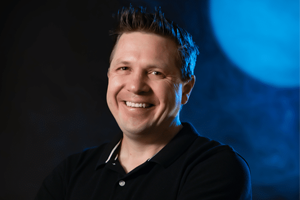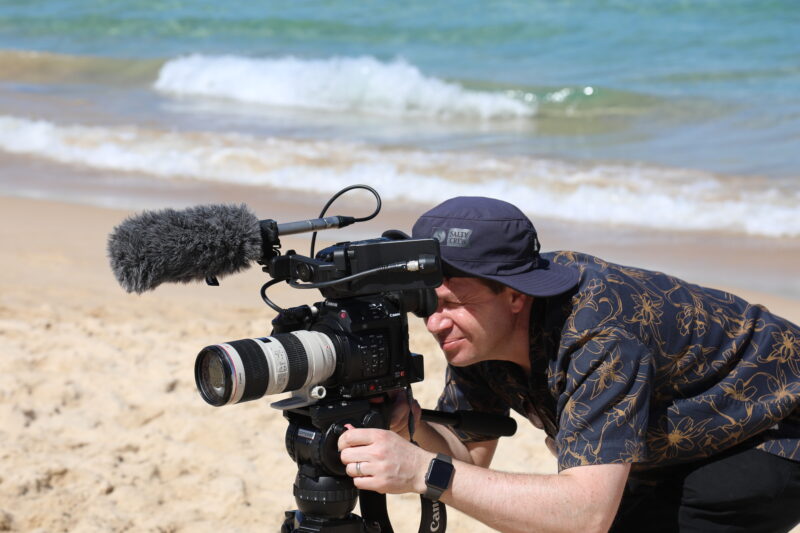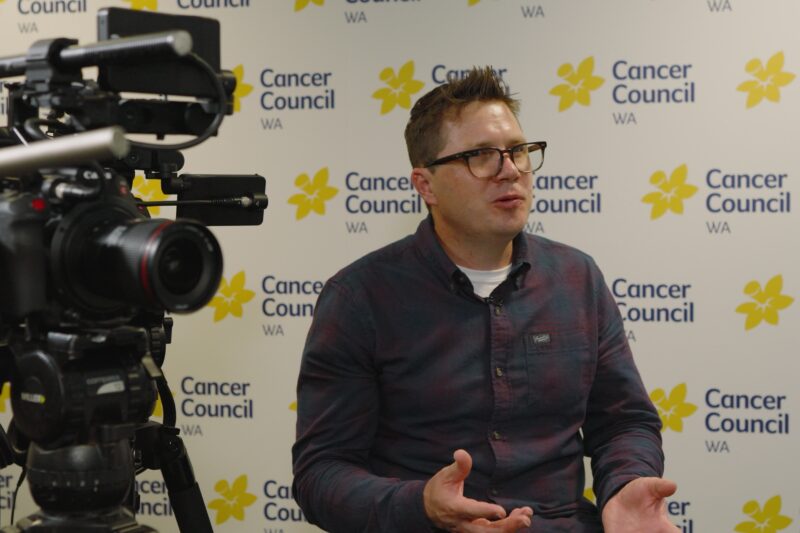Press

We’re sitting down with multi-award-winning filmmaker, and director of Conquering Skin Cancer, Mike Hill, to hear how this important project came to fruition.
Mike, thank you for being here. My first question is deceptively simple- why are you making this film?
A primary motivation behind the making of this film was the statistics in Australia; 2 out of 3 Australians will get a skin cancer in their lifetimes. And I’ve had quite a lot of skin cancer in my family.
So I’m one of four boys in my generation and family, and my brothers are very active, outdoor people, and love spending time in and around the water in particular.
I didn’t realise that water activities are at a much higher risk for skin cancer. And there are some studies that have said they’re as much as 200 times higher for people who surf every day.
So for me, it was that personal connection to the subject matter that made me want to tell this story.
You’ve made a lot of impact films and documentaries throughout your career, which require immense and quite extensive research. So for Conquering Skin Cancer specifically, could you tell us about the key things you’ve learned throughout this filmmaking process?
Were there any unexpected challenges or surprising facts that you encountered whilst making it?
The thing about impact films is they’re designed to be, like any film, engaging and entertaining, and take the audience on a journey. But they want to do one other thing, which is really activate them, and help them be able to take some positive action in their lives.
So with skin cancer, that positive action is really about how can we protect ourselves, look after ourselves, and look after others in our lives, um, so that they don’t get skin cancer. Because we know that 98% of skin cancer is preventable.
So some of the key outtakes from the film are really about sharing things that the audience probably feels like they’ve heard a million times before, like Slip, Slop, Slap; but telling that story in a slightly different way, so that it makes an impact that can really help shift behaviour.
Even for myself, I found through the process of making this film and meeting the participants, particularly the ones who’d had to be through really extensive immunotherapies, for example, that had really changed the course of their lives. It became really interesting to see how my own behaviour changed as a filmmaker through the process.
I went from being someone who would just wear a cap and occasionally chuck on some sunscreen, to someone who will apply sunscreen every single day when UV is going to be over 2. I reapply during the day, have hats and long-sleeve shirts, and some protective clothing at different places in my lifestyle. So, for example, in the car or, you know, in a beach bag or in a sports bag.
So I found that I was being much more sun safe as I went, and I hope that we have the same effect on the audience after they see this film.
In telling these stories, the visual storytelling in documentaries is pretty key to their impact. How did you approach capturing the essence of skin cancer prevention and awareness visually in this film?
Were there any specific shots or scenes that you felt were essential to capturing the essence of your message?
In terms of the visuals, we wanted to make the film as cinematic as we could.
And of course, the sun is actually a character in this film. So filming the sun is really interesting, and we’re able to film it in all types of different ways; including with aerial photography, but also using lens flares and different types of lens that really highlight the sun.
And also getting a sense of the heat, in the different locations where people tend to be at higher risk, for example, in and around the water, and doing active outdoor activities.
It was really fun to shoot for one thing, and we had to do it in a sun-safe way, which was interesting for us as a crew because we had to change our behaviours as filmmakers to achieve
that.
I remember, for example, being down at Bondi Beach, which I call, like, ground zero for skin cancer in Australia, and being totally covered up, with a long lens, just covering people who are in bikinis and stuff, just baking themselves.
So that was part of the journey. And those visuals, particularly things that have to do with nature, water, sun, and reflection, all come into this film.
You spoke a little earlier about the voices and the characters that you interviewed and told the stories of in this film. Conquering Skin Cancer features an incredibly impressive cast from scientists to surfers, celebrities, survivors and advocates. Could you maybe tell us a bit more about those voices throughout the film and their messages, and your experience shooting with these people?
Well, the first thing is there’s a lot of voices in the film and that was deliberate; it was by design because we thought that we had to have a whole chorus of voices. Australians from all different walks of life talking to this, because one of the central arguments of the film is the only way we can conquer skin cancer, is if we all come together and play our part.
So that was a really big part of it. And you’re right, there are so many great participants in the film.
From people who’ve had a skin cancer, changed the course of their life, to become incredible activists; people like Anne Gately, Scott Maggs, Tamara Dawson and Jay Allen, who’ve all gone on to start their own foundations or write books and make a huge impact.
To leading scientists in the film; like our Australians of the Year, Richard Scolyer and Georgina Long, and other experts in their fields like Grant McArthur from Peter McCallum Cancer Centre, and so many others. To everyday Australians, you know, from very remote areas like Karratha, to regional areas like Coffs Harbour, to cities around Australia.
And then we’ve got some really high profile participants in the film as well, including Olympian Cate Campbell, pro surfer Rabbit Bartholomew, Costa Georgiadis, Logie Winner, and Deborah Hutton, media personality; and one yet to be announced, A-list Hollywood actor who we’re really excited about dropping that news and sharing with the world later on in the campaign.
Fantastic, very excited to hear more about that! You touched on this briefly earlier, but you’ve had quite a personal link to skin cancer media specifically from quite a young age.
What are your personal motivations and experiences behind making this film?
My dad worked in cancer control for his whole career, from the age of twenty-one until he retired. He worked at the Cancer Council of Victoria, and it’s interesting to hear of someone dedicating their whole career to a topic. And over the course of his career, he became a real leader and became quite well known as a spokesperson for all different types of cancers in Australia and abroad.
But interestingly, he was right there at the start of the Slip, Slop, Slap campaign. This is not when he was a leader in his organization, but he was given the task of developing a new campaign and working with some of the leading ad men in Australia at that time- and I say men because unfortunately, it was all males that worked on that campaign! But they came up with a very iconic campaign that made a really big impact for many decades really.
And because of that, I was exposed to that messaging from a very young age, so that was a big part of my upbringing. I found some really funny photos of me at kindergarten wearing Sid the Seagull t-shirts and stuff like that. And I realised that this has actually been a part of my life since day one.
But even despite that, you know, I wasn’t the most sun-safe, in particular, teenager, you know. Like so many Australians, I was out there on the beach, loved going to the beach, loved playing sports outdoors, and got more than my fair share of harmful UV. So I had those peeling skin tans, which I know, because of my fair skin colour, would put me at a higher risk.
So this is a situation that so many of us are in now, and that’s why we’re making this film to help try and support that behaviour change that now needs to happen to make outdoor activities more safe in the future.
Thank you for sharing that. The emotional journey of making a documentary, even without the personal ties to it, can always be really intense, I’m sure. Were there any particularly moving or challenging moments, or stories from production that had a particularly profound impact on you personally?
There were some very visceral moments, where some of the participants, who are so courageous in sharing their stories, you could see the visual damage of skin cancer on their lives. So, some of the participants, for example, had prostheses; like a prosthetic leg, or had lost an eye. Some had major changes to their skin, like vitiligo, where their whole pigmentation had changed in their skin.
Others that had major surgeries and skin grafts, you know, which had really changed the way that they felt about themselves. And some even spoke about “mirror trauma”, and how traumatic it is to have major surgery, particularly to your face and head. All of these things left a really deep impression.
And I’m so thankful to those people for sharing their stories, because I think they are amongst the best spokespeople to really help the rest of us look after ourselves, and prevent the same thing happening to us.
Absolutely- and advocacy through those stories, and through film particularly, can be so powerful.
How did you go about balancing factual information with the emotional storytelling, to ensure this message really resonates effectively with audiences?
It’s always a bit of a balancing act between how do you bring in scientifically based, evidence- based health information, and combine it with powerful human interest stories.
Too much evidence-based information will make a film feel like it’s something you’d watch at school or in an educational setting, and might generate a bit of a switch-off for the audience. If you don’t have any of it, then you’re not really giving the audience the reason why they need to change their behaviour.
It’s a real balancing act that we go through in the post-production of the film. What’s the right blend? What’s the right tempo? So that’s something that I hope we’ve been really successful with.
I’m really proud of the film as it’s coming together in terms of; it’s very visual, it’s very engaging, it’s fast-paced, at times it’s funny, at other times it’s really deeply emotional.
So we’re really hoping to take the audience on a journey, and at the end of it, hoping that something’s changed inside them that may help them look after themselves, or potentially save someone else’s life.
And that is such an important and defining characteristic of the impact film genre!
To expand on that, you have touched on in your own lifestyle and perspective changes about skin cancer prevention- but what explicitly do you hope that viewers will take away from Conquering Skin Cancer, or what long-term actions or behavioural changes do you hope it will inspire?
I hope that there are lots of different types of people in the audience from people who might work in government, to councils, to schools, teachers; and then people from just everyday walks of life. And I’m hoping they take away something slightly different from the film, depending on what their lifestyle is like.
But the main outtake is, we all have a role to play in Conquering Skin Cancer.
So, if you volunteer at a local sports club, and that sport takes place during high UV periods and the uniform is not sun-safe- there’s something you can do to advocate for better uniforms to look after those players.
Or if there’s no shade at that particular sporting venue, maybe you can do something about that. Maybe you can just encourage people to wear a bit of sunscreen by bringing it along to the picnic that you’re going to, or whatever other activity that’s taking place outside.
As Australians, we are at a much, much higher risk of skin cancer. We have 10% of the world’s melanomas here in Australia, but well under 1% of the world’s population.
So unfortunately this is a big issue here. But it’s also one that is largely preventable by changing behaviour. So I’m hoping that whether it’s our Prime Minister supporting public health campaigns, or someone who is just able to look after their students.
I hope that everyone who watches this film can take one action, you know, that can make us a little safer from this cancer.
Conquering Skin Cancer is focused on Australia, because as you say, we have the highest rates of skin cancer in the world. The statistics are staggering.
But the global reach of documentaries can be vast and very impactful. So, after the success of the Australian launch, are there any specific international audiences or regions you’re particularly excited to share this film with eventually?
We’re really excited that there’s actually a US version of this film coming out in the Northern summer in May, 2025. So that’s really exciting, but there are other parts of the world where skin cancer is a really big issue.
For example, in Europe, there are really high rates of skin cancer.
And that’s another area that I either hope that the existing films can travel to, or that we might be able to make localised versions to also help people in that region.
Fantastic. Is there anything else you would like people to know about Conquering Skin Cancer and your filmmaking process?
To make this film as successful as possible, we really need people to get behind it and share information about screenings of the film with their local community. And we call these people Champions- getting behind local film screenings and sharing information with their local sports clubs, or organisations and groups that they’re involved with in their community.
This is such an important part of us making an impact. So we’d invite the audience that’s seeing this to get behind it and find out more by following this link.
Brilliant, thank you! And to wrap up with possibly the most important of questions- how and when can people see Conquering Skin Cancer?
The film releases on the 20th of November this year, the first day of National Skin Cancer Awareness Week.
We’d love people to get along to see it in the cinema over the summer.

